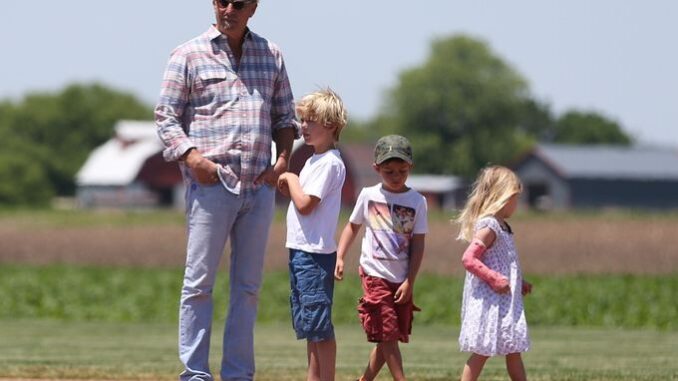
The Unseen Loom: When the Threads of Yellowstone Frayed for Kevin Costner
The vast, unforgiving sky of Montana, the thundering hooves across the open range, the unflinching gaze of John Dutton – for years, these images were synonymous with Kevin Costner, a potent blend of actor and character that had become the very bedrock of Yellowstone. Costner, with his weathered charm and inherent gravitas, embodied the patriarch fighting to preserve his family’s legacy, a performance so iconic it was difficult to imagine the show, or the landscape, without him. Then, the whispers began, growing louder with each passing season, until the inevitable announcement broke: Kevin Costner was leaving. The shock rippled through the show’s devoted fanbase, spawning theories ranging from creative differences to exorbitant demands. But Costner’s own explanation, delivered with the quiet, weary honesty of a man stating a simple truth, cut through the noise with the precision of a scalpel: “The scripts never came.”
It’s a declaration that, on the surface, sounds almost mundane, yet it reveals a profound rupture in the elaborate machinery of a Hollywood production. An actor of Costner’s caliber doesn’t walk away from a tentpole series, a character he’s sculpted and lived in, on a whim. His commitment to Yellowstone was, by all accounts, deep-seated. He wasn’t merely a hired hand; he was John Dutton, a character steeped in the same kind of American mythos Costner himself has often explored. The audience saw the finished product, the sweeping vistas and intense familial drama, but behind the seamless illusion lies a complex choreography of writers, producers, directors, and actors, all relying on a fundamental exchange: the delivery of the script.
Imagine a master craftsman, poised at his loom, ready to weave a magnificent tapestry. He has the vision, the skill, the experience. All he needs are the threads, laid out in a specific pattern, ready for his hands to transform them into art. Now imagine those threads simply failing to arrive. Days turn into weeks, weeks into months. The loom sits idle. The craftsman’s tools gather dust. His schedule, once meticulously planned to accommodate this grand project, becomes a perplexing void. He has other commitments, other tapestries to weave, but he remains tethered, waiting for the material that never appears. This, in essence, is the tableau Costner painted.
“The scripts never came” speaks volumes about the professional limbo, the mounting uncertainty that must have gnawed at him. An actor needs lead time. They need to understand the arc of their character, the demands of the story, the emotional landscape they are expected to inhabit. Without a script, there is no preparation. There is no scheduling. There is only a promise, hanging in the air like Montana dust, becoming thinner and more translucent with each passing day. Costner wasn’t asking for an outline or a vague concept; he was asking for the tangible pages, the words that would bring John Dutton back to life for another season.
For a veteran like Costner, whose career spans decades and includes directing ambitious projects like Horizon, this lack of concrete material isn’t just an inconvenience; it’s a fundamental breakdown of professionalism. It signals a chaos behind the scenes, an inability to deliver on basic operational promises. When the core creative document is absent, it impacts everything: the actor’s ability to commit to other projects, the production’s budget, and ultimately, the integrity of the storytelling itself. It suggests that the meticulous planning required for a show of Yellowstone‘s scale had, for whatever reason, begun to unravel.
Costner’s explanation, then, isn’t an accusation of malice, but a sober account of a logistical failure that made his continued participation untenable. It implies a situation where a performer, whose time is valuable and whose professional commitments are interconnected, was left waiting, unable to move forward with either Yellowstone or his other ventures. The trust, the implicit contract between actor and production, had been eroded by the ghostly silence where pages should have been.
In the end, the departure of Kevin Costner from Yellowstone serves as a stark reminder that even in the polished, seemingly effortless world of prestige television, the most fundamental elements can falter. The myth of the lone cowboy, riding off into the sunset, takes on a new, poignant resonance when the reason he dismounts is not a dramatic finale, but simply because the path ahead was never drawn, the words never written. The script, after all, is the very soul of the story, and when it never arrives, even the most enduring characters eventually fade into the unseen loom of Hollywood’s broken promises.
